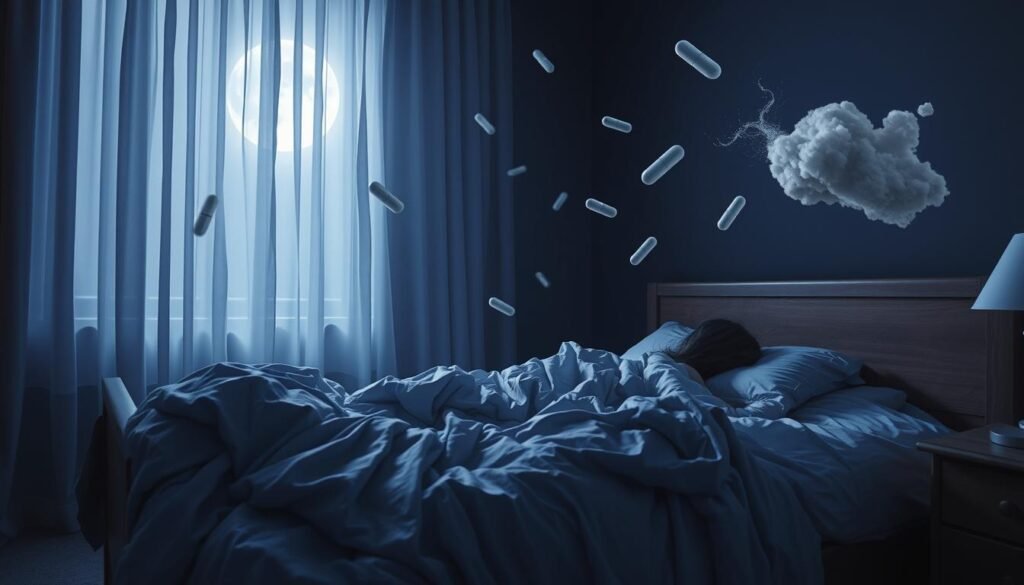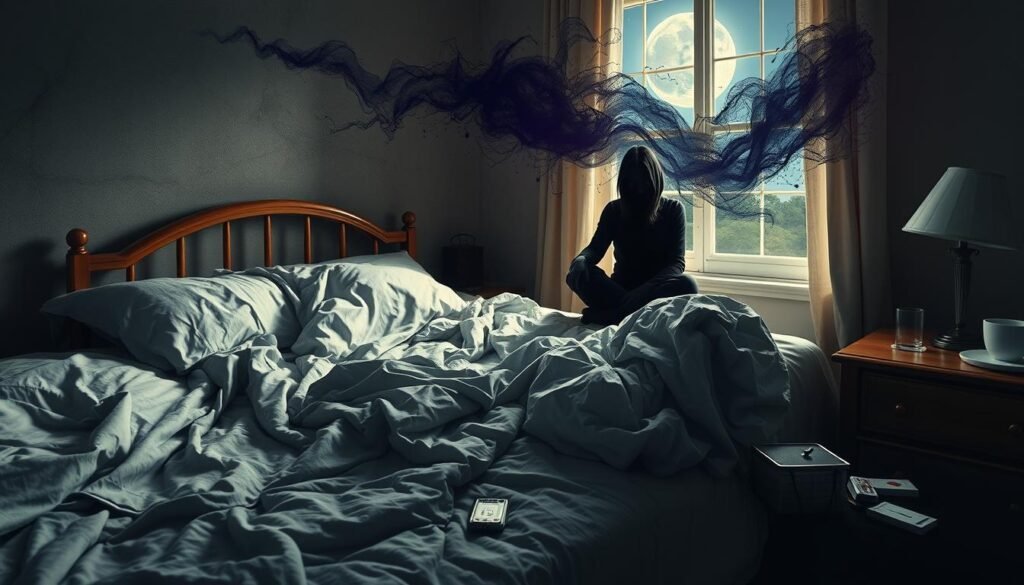It’s quite surprising, but about 20% of those taking the antidepressant Fluoxetine may struggle with insomnia. This side effect can greatly affect daily routines. Known also as Prozac, Fluoxetine is often given for mood disorders. Yet, it might cause sleep troubles.
This piece looks deeply into Fluoxetine side effects, with a focus on insomnia. We will understand how Fluoxetine works and discuss ways to manage its sleep-related issues. The goal is to help readers learn about this common medication’s impact on sleep.
Key Takeaways
- Fluoxetine can cause insomnia in some users, affecting around 20% of patients.
- Understanding the side effects of Fluoxetine is important for managing treatment.
- Insomnia related to Fluoxetine may be linked to its impact on serotonin levels.
- Adjustments in medication timing and dosage can potentially alleviate sleep issues.
- Coping strategies, including behavioral therapies, can be effective in managing insomnia.
- Long-term effects of Fluoxetine on sleep quality can vary among individuals.
- Consulting healthcare providers is essential for addressing any sleep disturbances.
Understanding Fluoxetine
Fluoxetine is well-known by its brand name, Prozac. It’s a type of drug called a selective serotonin reuptake inhibitor (SSRI). This antidepressant medication works by boosting serotonin in the brain. This helps improve mood and lessen depression and anxiety symptoms.
Knowing about Fluoxetine is important. It comes in capsules, tablets, and liquid forms to meet different needs. You can find it in various strengths: 10mg, 20mg, 30mg, 40mg, and 60mg capsules. There are also 20mg per 5ml liquid solutions, along with 20mg and 10mg dispersible tablets.
Fluoxetine is for adults, mainly for treating depression, bulimia nervosa, and OCD. It can also help kids aged eight to 17 with depression, when combined with therapy.
The benefits of Fluoxetine for depression might start in one to two weeks. But full advantages could take up to four weeks. For anxiety or OCD, it might take three months to see major improvement. Knowing these timelines can help manage expectations about treatment.
Like any medication, Fluoxetine can cause side effects. Common ones include dry mouth, dizziness, and often, insomnia. Initially, it might make you drowsy, but this usually goes away after a few weeks. Always watch your symptoms and talk to your doctor if you’re worried.
| Formulation | Strengths Available |
|---|---|
| Capsules | 10mg, 20mg, 30mg, 40mg, 60mg |
| Liquid | 20mg per 5ml spoonful |
| Tablets | 10mg |
| Dispersible Tablets | 20mg |
What is Fluoxetine and How Does it Work?
Fluoxetine is widely known as an antidepressant. It falls into a group called selective serotonin reuptake inhibitors (SSRIs). The way fluoxetine works is by managing the levels of serotonin in the brain. This neurotransmitter is key in keeping our mood balanced. When fluoxetine stops serotonin from being reabsorbed, more of it stays available. This helps enhance mood and ease mental health symptoms.
Fluoxetine treats various conditions like major depressive disorder, obsessive-compulsive disorder (OCD), and bulimia nervosa. Most times, patients start to feel better from their depressive symptoms within the first two weeks of treatment. But, it might take up to four weeks to see the full effects. For people dealing with anxiety or OCD, the full effects could take up to three months to become noticeable.
How people react to fluoxetine can differ greatly. Things like one’s age, mental health history, and other medicines can affect this response. That’s why talking to a healthcare provider for advice is crucial. Especially when considering the side effects or how fluoxetine might interact with other meds.
| Condition | Typical Onset of Effects | Full Benefit Timeline |
|---|---|---|
| Depression | 1-2 weeks | Up to 4 weeks |
| OCD | 1-2 weeks | Up to 3 months |
| Bulimia Nervosa | 1-2 weeks | Up to 4 weeks |
Fluoxetine plays a critical role in managing mood disorders. For many, it brings hope and significant improvement in battling mental health challenges.
Common Side Effects of Fluoxetine
Fluoxetine, often called Prozac, comes with several common side effects. Patients frequently report nausea and headaches. They also feel very tired, making it hard to get through the day. Around 19% of people in studies have trouble sleeping, a notable Fluoxetine reaction.
There are other antidepressant side effects too. These can mess with how hungry you feel and digestion. About 12% of users might find themselves feeling sleepy or drowsy. Knowing about these common side effects helps patients know what to expect.
Understanding these issues lets patients spot trouble early. This means they can talk things over with their doctors. If problems don’t go away or make daily life tough, it’s key to get medical advice. This ensures everyone stays safe and healthy.
| Common Side Effects | Prevalence (%) |
|---|---|
| Nausea | Varies |
| Headaches | Varies |
| Fatigue | Common |
| Insomnia | 19% |
| Somnolence | 12% |
| Gastrointestinal Issues | Common |
It might take a few weeks for your body to adapt to Fluoxetine. Talking to your doctor during this time helps. With a little bit of time, many people begin to feel better.
Can Fluoxetine Cause Insomnia?
Looking into how Fluoxetine affects sleep is key for anyone thinking about this antidepressant. Many report trouble sleeping as an effect of Fluoxetine. This brings up an important question: Does Fluoxetine lead to insomnia?
Prevalence of Insomnia Among Fluoxetine Users
A lot of patients on Fluoxetine say they can’t sleep well. About 20-30% of people using Fluoxetine have this issue during their treatment. The likelihood of facing insomnia depends on several factors. These include how much medicine you take, your health history, and other drugs you might be using. Paying attention to these factors is critical in reducing sleep problems.
Mechanism of Action Related to Sleep Disturbances
Fluoxetine works by boosting serotonin in the brain, which affects sleep. Serotonin helps manage mood but its impact on sleep is complex. High levels of serotonin can make it hard to fall asleep or stay asleep. Knowing this helps us understand why some people on Fluoxetine struggle with insomnia.

Fluoxetine Side Effects Overview
Fluoxetine, more commonly known as Prozac, is often prescribed for various mental health issues. For those thinking about this medication, it’s important to know the side effects. These can be both physical and mental.
Physical Side Effects
Patients experience a range of physical side effects from fluoxetine. Some common ones include nausea, headaches, and weight loss. About 2% of patients may lose weight.
Sexual dysfunction and diarrhea are also reported. Sexual dysfunction affects about 4%, while diarrhea affects 11% of patients. The side effects vary with dosage and personal health conditions.
Insomnia is a significant side effect, seen in 16% to 33% of those taking the medication. This shows the importance of considering individual risks when taking fluoxetine.
Mental and Emotional Side Effects
Fluoxetine’s impact on mental health can greatly affect a patient’s life. Anxiety hits 12% of patients, more than the 7% who only took a placebo. Young people might see mood swings and more depression.
This medication comes with a serious warning for increased suicide risk in the young. Worsening depression occurs in a small percentage, between 0.1% and 1%. It’s vital for young patients to be cautious.
Insomnia and emotional side effects like feeling nervous or agitated make treatment challenging. Knowing these mental health risks is key for both patients and doctors. For deeper information on fluoxetine side effects, you can look at this resource.
SSRI Insomnia and Its Implications
SSRI-induced insomnia is a big issue for those using meds like fluoxetine. The implications of sleep disturbances stretch wide. They often make mental health conditions worse, not better. Up to 90% of people with major depression also have trouble sleeping. This affects their mental and physical health deeply.
There’s a complex link between sleep problems and major depression. Sleep may become less restful due to changes, including less efficient sleep and messed-up REM sleep. These sleep issues can increase the risk of suicide and make it harder to stick to treatment plans. About 79% of patients still have mid-night insomnia even when their depression improves a bit.
About 60% of those with bipolar disorder struggle with insomnia during down times. Meanwhile, 20-30% end up sleeping too much during the day. This shows how antidepressants and sleep issues play a big role across different mental health challenges.
It’s crucial to tackle implications of sleep disturbances early. If not handled, insomnia can worsen mental health issues in a cycle. There should be treatment plans that look at both mood and how well one sleeps.

Prozac Sleep Problems: What Are They?
Prozac, also known as fluoxetine, can cause sleep troubles. Some people have trouble falling asleep or wake up often at night. These Prozac sleep issues can affect your overall health if you don’t address them.
Taking Prozac in the morning might make you feel more awake during the day. This can help those who have Fluoxetine and sleep disturbances. On the other hand, Prozac with Zyprexa (olanzapine), or Symbyax, may make you sleepy. So, it’s better to take it in the evening.
At the beginning of treatment, many people experience insomnia. Usually, these issues get better as your body adjusts to the medication. If sleep problems don’t go away, talk to your doctor. They might change your dose or suggest a different treatment. For more details on dealing with anxiety and sleep issues, check out best medication for anxiety and insomnia.
Fluoxetine Dosage Adjustments and Sleep Quality
Fluoxetine, a common drug for depression and anxiety, is key to treatment. Adjusting its dose affects sleep quality and how well the medicine works. So, watching sleep patterns is important, as changes in sleep can really affect daily life.
When to Consult a Doctor about Dosage
Talking to doctors about sleep when on Fluoxetine is crucial. If sleep issues pop up, especially with dose changes, it’s time to see a doctor. Always tell them if it’s hard to sleep or stay asleep.
- Keep a sleep diary to track patterns and disturbances.
- Discuss any noticeable changes in mood or behavior related to sleep issues.
- Share any other medications being taken, which may affect sleep quality.
Patients taking control of their medication can lead to better health results. Knowing about sleep side effects helps work with doctors. Together, they can make the best plan for medication doses, improving both sleep and mental health.
| Issue | Recommended Action |
|---|---|
| Insomnia | Consult a doctor to evaluate dosage and explore alternatives. |
| Excessive Daytime Sleepiness | Discuss potential adjustments with healthcare provider. |
| Changes in Mood | Regularly communicate with the doctor regarding mental health. |
| Interactions with Other Medications | Inform the doctor about all medications being taken. |
Managing Antidepressant Insomnia
Dealing with insomnia from antidepressants needs a plan that covers different aspects. If you’re finding it hard to sleep because of Fluoxetine, there are several steps you can take to sleep better. Creating a regular sleep schedule is key. Sleeping and getting up at the same time every day helps set your body’s clock. This makes getting deep, refreshing sleep more likely.
Trying relaxation methods before bed can also help you sleep better. Techniques like deep breathing, easing muscle tension step by step, or imagining calming scenes can calm your mind and body. This helps fight insomnia caused by Fluoxetine. If you often feel anxious or have too many thoughts at night, practicing mindfulness can help.
Making your sleeping area ideal is very important for good sleep. Your bedroom should be quiet, dark, and cool for the best sleeping environment. Not using screens before bedtime will cut down on blue light. This helps avoid messing up your sleep schedule.
Also, stay away from caffeine and activities that keep you awake before bedtime. Doing something calm, like reading, is better than doing things that energize you.
Table 1 below shows some good ways to manage insomnia from antidepressants:
| Strategy | Description |
|---|---|
| Regular Sleep Schedule | Go to bed and wake up at the same time daily. |
| Relaxation Techniques | Practice deep breathing or meditation before bedtime. |
| Sleep Environment | Keep the bedroom dark, cool, and quiet. |
| Limit Screen Time | Avoid screens 1-2 hours before sleeping to reduce blue light exposure. |
| Healthy Evening Routine | Engage in relaxing pre-sleep activities like reading. |
| Avoid Stimulants | Reduce caffeine and stimulating habits in the evening. |
Some people may improve their sleep with these lifestyle changes, but others might need a doctor’s help for customized advice. Keeping track of your sleep and talking about any problems with a professional can help you find the best plan to deal with your insomnia from antidepressants.
Coping with SSRI-Induced Insomnia
Sleep issues caused by SSRIs like Fluoxetine can be tough to handle. People often look for ways to sleep better. Trying a mix of behavioral changes and different meds can help.
Behavioral Strategies for Better Sleep
Using behavioral strategies for sleep can make a big difference in how well you rest. Techniques, including cognitive behavioral therapy for insomnia (CBT-I), help tackle sleep problems. These strategies can help:
- Keeping a regular sleep schedule.
- Having a calming routine before bed to get your body ready for sleep.
- Staying away from caffeine and big meals late in the day.
- Not using screens right before bed.
- Being active during the day to improve sleep at night.
Possible Medication Alternatives
If SSRI insomnia is a problem, looking into other meds for sleep might work. Mirtazapine or trazodone could be added to SSRIs. They often don’t have major negative effects. Always talk to a healthcare professional before making changes.

Finding the right mix of behavior changes and meds can seriously improve sleep. What works can differ from person to person, so solutions should be personalized.
Long-Term Effects of Fluoxetine on Sleep
Fluoxetine’s long-term effects on sleep give us deep insights. It shows how continuous use can change sleep patterns and quality. Particularly, it affects sleep quality over time for those using this antidepressant. A study comparing fluoxetine to a placebo showed a major drop in rapid eye movement (REM) sleep. This happened after only six days of taking 20 mg/day. This drop is like what we see with other long-term antidepressant use. People often notice changes in how they sleep. You can read more about these patterns at established patterns of antidepressant long-term sleep.
It was also found that it took people longer to fall asleep. And, it took them longer to reach REM sleep. But, they did not wake up more during the night. This means some parts of their sleep were still okay. Fluoxetine made people spend more time in stages 2 and 3 of sleep. This means the way our sleep heals us might be changing.
Even with these shifts, deep sleep levels stayed the same over time. This is good news since deep sleep helps our body and mind recover. Even though some people might have side effects, these points show why we must watch how Fluoxetine affects us over time.
People using Fluoxetine for a long time might see some sexual side effects that could last. They also might have a higher chance of sleep disorders. This is a worry for those who might already struggle with sleep problems like insomnia. These points remind doctors to keep an eye on sleep quality. This helps make sure patients are cared for in every way.
| Study Findings | Impact on Sleep |
|---|---|
| Decrease in REM sleep | Significant |
| Increase in sleep-onset and REM latency | Observed |
| No significant increase in awakenings | Stable |
| Increase in stages 2 and 3 sleep | Notable |
| No change in slow-wave sleep | Stable |
Conclusion
Understanding how Fluoxetine affects sleep is very important. It helps patients make better choices in their treatment. This overview shows not just the good sides but also how it might cause insomnia. A small dose of Fluoxetine, like 20 mg/day, can change how we sleep a lot. It decreases the rapid eye movement (REM) sleep and makes it take longer to fall asleep.
Fluoxetine’s impact on sleep isn’t only about insomnia, which 7% to 22% of users might experience. Some people say their sleep quality gets better, even with these changes. This shows the complex effects antidepressants can have. It’s crucial for patients and doctors to talk openly about any sleep problems.
Learning more about sleep and antidepressants will help improve mental health care. To get a full picture of how these medicines, like Fluoxetine, affect sleep, we need more research. For more details, check out this overview of the effects of antidepressants on sleep.